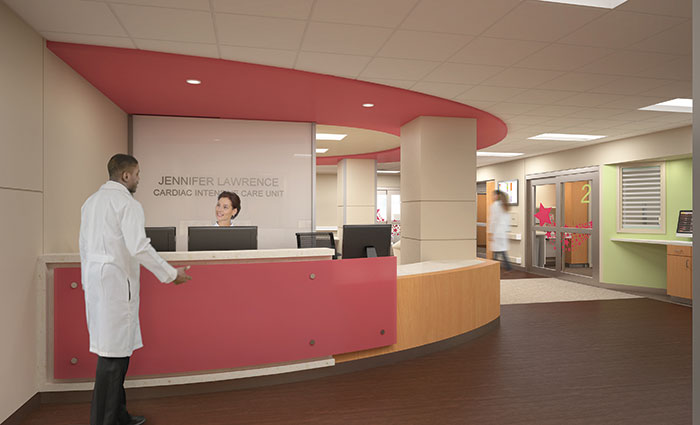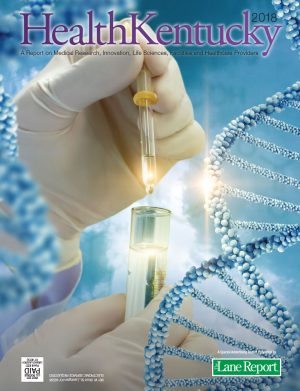
Providing more than 124,500 annual visits, procedures and hospital stays for adults and children with heart and vascular care throughout their lives, Norton Heart & Vascular Institute and Norton Children’s Heart Institute, affiliated with the University of Louisville, are Greater Louisville’s leading heart-care destinations.
 “The investment we have made in heart care is most clearly demonstrated by the size and quality of our adult and pediatric cardiovascular teams,” said Steven T. Hester, M.D., MBA, division president, provider operations, and system chief medical officer, Norton Healthcare. “Our community and region can feel confident knowing that if they need heart care for any age, it’s available and it’s close to home.”
“The investment we have made in heart care is most clearly demonstrated by the size and quality of our adult and pediatric cardiovascular teams,” said Steven T. Hester, M.D., MBA, division president, provider operations, and system chief medical officer, Norton Healthcare. “Our community and region can feel confident knowing that if they need heart care for any age, it’s available and it’s close to home.”
Recognized for excellence
Clinical outcomes are important to the entire team.
For instance, the “door-to-balloon” times at Norton Audubon Hospital, Norton Brownsboro Hospital and Norton Hospital are 20 to 39 minutes faster than the best-practice time of 90 minutes established by the American College of Cardiology (ACC). Door-to-balloon is the time elapsed from when a patient enters the emergency department with chest pain to when a diagnosed fully blocked artery is opened with a catheter.
In 2017, Norton Hospital met or exceeded the goal time 100 percent of the time, with Norton Audubon Hospital at 97 percent and Norton Brownsboro Hospital at 96 percent.
In fact, all four Norton Healthcare adult-service acute care hospitals have received Adult Division Cycle V Chest Pain Accreditation by ACC Accreditation Services, the highest level possible.
Patients with atrial fibrillation (A-fib) also are benefiting from Norton Healthcare’s commitment to excellence.
The ACC awarded Atrial Fibrillation with Electrophysiology Services reaccreditation to Norton Audubon Hospital and Norton Hospital. Initially earned in 2014 and reaccredited in 2017, the designation is based on a rigorous on-site evaluation of the multidisciplinary team’s ability to evaluate, diagnose and treat patients with A-fib.
“The reaccreditation recognizes our team effort in diagnosing and educating people living with A-fib and our focus on providing what is best for these patients from diagnosis to treatment to continuous education,” said Kent E. Morris, M.D., clinical cardiac electrophysiologist, Norton Heart Specialists.
Additionally, three of the four hospitals in Kentucky presented with the American Heart Association’s Mission: Lifeline award are Norton Healthcare facilities. The award is given for implementing specific quality-improvement measures for treatment of patients experiencing severe heart attacks.
Investing in the best heart technology
An important part of consistently being the gold standard is investment in advanced technologies.
With support from the Norton Healthcare Foundation, Norton Healthcare was the first in the region to invest in remote dielectric sensing (ReDS) for congestive heart failure.
Expanding on radar technology created for the military, the ReDS wearable vest uses medical radar to see through the wall of the chest and inside the lungs in just 90 seconds. Heart failure specialists can measure dangerous fluid content around the lungs, allowing care providers to immediately take action, even before the patient notices any symptoms.
“This life-changing technology allows us to respond very quickly to change medication and educate the patient on steps they can take to help reduce their internal fluid,” said Kelly C. McCants, M.D., cardiologist and medical director, Norton Heart & Vascular Institute Advanced Heart Failure Program.
For the growing number of patients with A-fib who have implantable defibrillators or monitoring devices, the Norton Heart & Vascular Institute Heart Rhythm Center has a 10-member team that remotely monitors more than 7,000 heart patients’ implantable devices. The pacemakers, defibrillators and implantable loop recorders send alerts that are reviewed by a clinical team every day.
The data can alert Heart Rhythm Center providers if a patient is going into heart failure, is experiencing A-fib, has been shocked with a defibrillator, has a mechanical malfunction of their device or has experienced another episode needing medical attention. This provides patients with peace of mind.
Leading the way in children’s heart care
Norton Children’s Heart Institute, affiliated with the University of Louisville, is a statewide leader in heart care for children, with 16 locations, 29 remote tele-echocardiography sites and four fetal tele-echocardiography sites across the commonwealth and southern Indiana.
Norton Children’s Heart Institute is the highest-rated program by the Society of Thoracic Surgeons in Ohio, Kentucky and Southern Indiana, and is Kentucky’s only pediatric heart transplant center. The pediatric heart transplant program features three cardiothoracic surgeons including Bahaaldin Alsoufi, M.D.; Erle H. Austin, M.D.; and Deborah J. Kozik, D.O.; and is accredited by the Centers for Medicare and Medicaid Services.
The 17-bed Jennifer Lawrence Cardiac Intensive Care Unit at Norton Children’s Hospital, Kentucky’s only pediatric cardiac intensive care unit, will be completed by 2020 thanks to support from the community through the Children’s Hospital Foundation.
“Having a child with a heart defect is scary for families,” said Mark J. McDonald, M.D., medical director, Norton Children’s Hospital. “We have the team and the technology to ease some of that anxiety.”
Through its affiliation with the University of Louisville, Norton Children’s Heart Institute has 20 pediatric cardiovascular physicians with specialties in heart surgery, adult congenital heart disease, advanced heart failure, electrophysiology as well as fetal, interventional and medical cardiology.
Diagnosing heart issues before the baby arrives
Thanks to advances in ultrasound technology, many parents are able to seek treatment and better prepare for a heart condition.
Most heart abnormalities are detected during a routine ultrasound and referred to the Fetal Cardiology Program for further evaluation through a fetal echocardiogram. This noninvasive tool uses ultrasound waves to evaluate an unborn baby’s heart.
With locations in Ashland, Paducah, Owensboro and Lexington, the results can be transmitted to a board-certified fetal cardiologist for review, allowing expectant families to work with maternal-fetal medicine specialists and others for care during and after delivery.
A (not-so) surprising link to adult heart care
One in every 100 babies is born with some type of heart defect, making congenital heart disease the most common type of birth defect. Thanks to many recent advances, more than 90 percent of these children now survive to adulthood living longer, healthier lives.
The Norton Children’s Heart Institute adult congenital heart disease program provides specialized care for this patient population once they reach adulthood.
The statewide network of specialized services is led by Craig H. Alexander, M.D., and Walter L. Sobczyk, M.D., who work with patients’ cardiologists to provide advanced diagnostic testing, cardiac imaging, interventional catheterizations, device implantation, complex arrhythmia therapies, complex surgical procedures and ongoing care.




















Add Comment